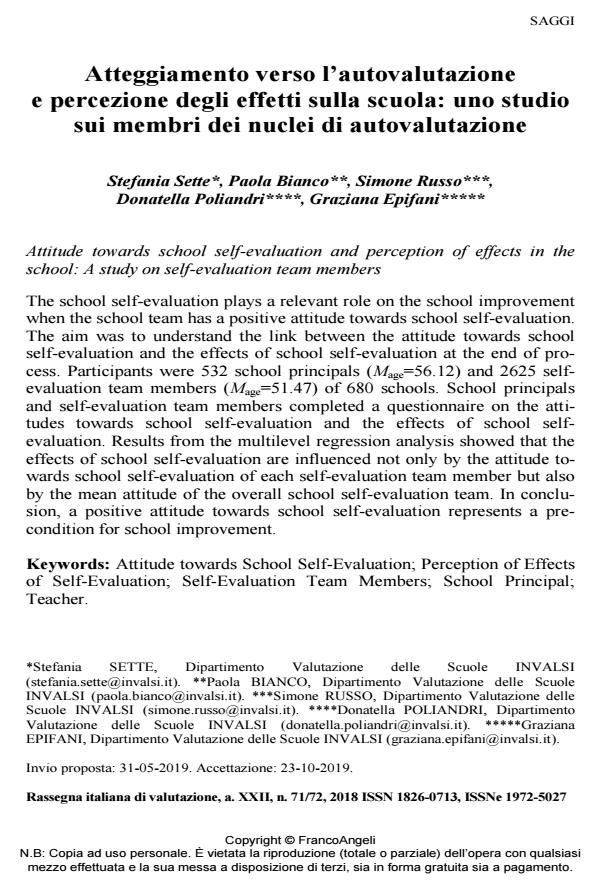Attitude towards school self-evaluation and perception of effects in the school: A study on self-evaluation team members
Journal title RIV Rassegna Italiana di Valutazione
Author/s Stefania Sette, Paola Bianco, Simone Russo, Donatella Poliandri, Graziana Epifani
Publishing Year 2019 Issue 2018/71-72
Language Italian Pages 18 P. 258-275 File size 448 KB
DOI 10.3280/RIV2018-071013
DOI is like a bar code for intellectual property: to have more infomation
click here
Below, you can see the article first page
If you want to buy this article in PDF format, you can do it, following the instructions to buy download credits

FrancoAngeli is member of Publishers International Linking Association, Inc (PILA), a not-for-profit association which run the CrossRef service enabling links to and from online scholarly content.
The school self-evaluation plays a relevant role on the school improvement when the school team has a positive attitude towards school self-evaluation. The aim was to understand the link between the attitude towards school self-evaluation and the effects of school self-evaluation at the end of process. Participants were 532 school principals (Mage=56.12) and 2625 selfevaluation team members (Mage=51.47) of 680 schools. School principals and self-evaluation team members completed a questionnaire on the attitudes towards school self-evaluation and the effects of school selfevaluation. Results from the multilevel regression analysis showed that the effects of school self-evaluation are influenced not only by the attitude towards school self-evaluation of each self-evaluation team member but also by the mean attitude of the overall school self-evaluation team. In conclusion, a positive attitude towards school self-evaluation represents a precondition for school improvement.
Keywords: Attitude towards School Self-Evaluation; Perception of Effects of Self-Evaluation; Self-Evaluation Team Members; School Principal; Teacher.
- Argyris C., Schon D. (1978). Organizational Learning: A theory of action perspective. Addison Wesley, reading MA.
- Barrilà D. (2018). I superconnessi. Come la tecnologia influenza le menti dei nostri ragazzi e il nostro rapporto con loro. Roma: Feltrinelli.
- Bertin G. (2007), Governance e valutazione della qualità nei servizi socio-sanitari. Milano: FrancoAngeli.
- Bezzi C. (2003). “Dalla comprensione dell’evaluando Allport, G.W. (1935). Attitudes. In: Murchison C.M., a cura di, Handbook of Social Psychology., Worcester, Mass.: Clark University Press.
- Blok, H., Sleegers, P., Karsten, S. (2005) Schoolzelfevaluatie in het basisonderwijs; een terugblik op de zelfevaluatiefase van Ziezo [School self evaluation in primary education]. Amsterdam, SCOKohnstamm Instituut.
- Commissione Europea/EACEA/Eurydice, 2015. Assicurare la qualità dell’istruzione: politiche e approcci alla valutazione delle scuole in Europa. Rapporto Eurydice. Lussemburgo: Ufficio delle pubblicazioni dell’Unione europea.
- Fishbeinm, M., Ajzen, I. (1975). Belief, attitude, intention, and behaviour: An introduction to theory and research, Reading, Mass.: Addison-Wesley.
- Fullan, M. (2011). Choosing the Wrong Drivers for Whole System Reform. CSE Seminar Series Paper 204. Melbourne: Centre for Strategic Education.
- Hofman, R.H., Dijkstra, N.J., Hofman, W.H.A. (2009). School self-evaluation and student achievement. School Effectiveness and School Improvement, 20:47-68. DOI: 10.1080/0924345080266411
- Janssens, F. J. G., van Amelsvoort, H. W. C. H. (2008). School self-evaluations and school inspections in Europe: an exploratory study. Studies in educational evaluation, 34:15-23.
- Kyriakides, L., Campbell, R. J. (2004). School self-evaluation and school improvement: A critique of values and procedures. Studies in Educational Evaluation, 30: 23–36.
- Maes, B., Vereecke, E., Zaman, M. (2002). School self-evaluation and inspection: A review of the literature. Belfast: SICI.
- Maslowski, R. (2001). School culture and school performance. Enschede: Twente University Press.
- McBeath, J. (1999). Schools must speak for themselves. London: Routledge.
- McBeath, J., Meuret, D., Schratz, M., Jakobsen, L. B. (1999). Evaluating quality in school education. Brussels: European Commission.
- Muthén L. K., Muthén B. O. (1998. –2017). Mplus User’s Guide, 8th Edn Los Angeles, CA: Muthén & Muthén.
- OECD (1998). Education at a glance. Paris: OECD.
- Palmonari, A., Cavazza, N., Rubini, M., a cura di (2002). Psicologia sociale. Bologna: Il Mulino
- Petty, R. E., Wegener, D. T. (1998) Attitude change: multiple roles for persuasion variables, in: D. Gilbert, S. Fiske & G. Lindzey (Eds). The handbook of social psychology. New York: McGraw-Hill.
- Şahin, S., Kılıç, A. (2018). School Self Evaluation Model Suggestion. International Journal of Instruction, 11: 193-206.
- Scheerens, J. (2017). Educational Effectiveness and Ineffectiveness: A Critical Review of the Knowledge Base. Springer: New York London.
- Schildkamp, K., Maaike, S., Blossing, U. (2019). Professional development in the use of data: From data to knowledge in data teams. Scandinavian Journal of Educational Research, 63: 393-411. DOI: 10.1080/00313831.2017.137635
- Schildkamp, K., Visscher, A. (2009). Factors influencing the utilisation of a school selfevaluation instrument. Studies in Educational Evaluation, 35: 150-159.
- Schildkamp, K. (2007). The utilisation of a self-evaluation instrument for primary education. Enschede: PrintPartners Ipskamp.
- Schildkamp, k., Visscher, A., Luyten, H. (2009). The effects of the use of a school selfevaluation instrument. School Effectiveness and School Improvement, 20: 69-88. DOI: 10.1080/0924345080260550
- Van Petegem, P., Verhoeven, J. C., Buvens, I., Vanhoof, J. (2005). Zelfevaluatie en beleidseffectiviteit in Vlaamse scholen. Het gelijke onderwijskansenbeleid als casus [Self evaluation and policy effectiveness of schools. A case study of the Flemish equal chances policy]. Ghent: Academia Press.
- Vanhoof, J., Van Petegem, P. (2010). Evaluating the quality of self-evaluations: The (mis)match between internal and external meta-evaluation. Studies in Educational Evaluation, 36: 20–26.
- Vanhoof, J., Van Petegem, P. V. (2011). Designing and evaluating the process of school selfevaluations. Improving Schools, 14: 200–212. DOI: 10.1177/136548021140688
- Vanhoof, J., Van Petegem, P, De Maeyer, S, (2009). Attitudes towards school self-evaluation. Studies in Educational Evaluation, 35: 21-28.
- Vanhoof, J., de Maeyer, S., Van Petegem, P. ( 2011). Variation in the conduct and quality of self-evaluations: A multi-level path analysis. Educational Studies, 37: 277-287. DOI: 10.1080/03055698.2010.50632
- Vanhoof, J., Van Petegem, P, De Maeyer, S, (2009). Attitudes towards school self-evaluation. Studies in Educational Evaluation, 35: 21-28.
Stefania Sette, Paola Bianco, Simone Russo, Donatella Poliandri, Graziana Epifani, Atteggiamento verso l’autovalutazione e percezione degli effetti sulla scuola: uno studio sui membri dei nuclei di autovalutazione in "RIV Rassegna Italiana di Valutazione" 71-72/2018, pp 258-275, DOI: 10.3280/RIV2018-071013